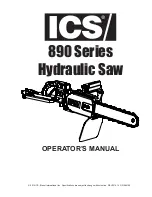
■
6
│
GB
PHKS 1350 B2
d)
Support large panels to minimise the risk of
blade pinching and kickback.
Large panels
tend to sag under their own weight. Supports
must be placed under the panel on both sides,
near the line of cut and near the edge of the
panel.
e)
Do not use dull or damaged blades.
Unsharpened or improperly set blades produce
narrow kerf causing excessive friction, blade
binding and kickback.
f)
Blade depth and bevel adjusting locking
levers must be tight and secure before making
cut.
If blade adjustment shifts while cutting, it
may cause binding and kickback.
g)
Use extra caution when sawing into existing
walls or other blind areas.
The protruding blade
may cut objects that can cause kickback.
Lower guard function
a)
Check lower guard for proper closing
before each use. Do not operate the saw if
lower guard does not move freely and close
instantly. Never clamp or tie the lower guard
into the open position.
If saw is accidentally
dropped, lower guard may be bent. Raise the
lower guard with the retracting handle and
make sure it moves freely and does not touch
the blade or any other part, in all angles and
depths of cut.
b)
Check the operation of the lower guard
spring. If the guard and the spring are not
operating properly, they must be serviced be-
fore use.
Lower guard may operate sluggishly
due to damaged parts, gummy deposits, or a
build-up of debris.
c)
Lower guard may be retracted manually
only for special cuts such as “plunge cuts”
and “compound cuts”.
Raise lower guard by
retracting handle and as soon as blade enters
the material, the lower guard must be released.
For all other sawing, the lower guard should
operate automatically.
d)
Always observe that the lower guard is
covering the blade before placing saw down
on bench or floor.
An unprotected, coasting
blade will cause the saw to walk backwards,
cutting whatever is in its path. Be aware of the
time it takes for the blade to stop after switch is
released.
Supplementary notes
■
Do not use any grinding discs.
■
Use only saw blade with diameters correspond-
ing to the label on the saw.
■
When sawing wood or other materials which
may create dusts that are hazardous to health,
always connect a suitable, certified vacuum
extractor device.
■
Wear a dust mask when sawing wood.
■
Use only the recommended saw blades.
■
Always wear ear protectors.
■
Do not allow the teeth of the saw blade to overheat.
■
When sawing plastic, avoid melting the plastic.
Safety information for
circular saw blades
Wear protective gloves!
Wear respiratory protection!
Wear protective glasses!
Wear hearing protection!
Summary of Contents for PHKS 1350 B2
Page 3: ......
Page 15: ...12 GB PHKS 1350 B2...
Page 29: ...26 HU PHKS 1350 B2...
Page 43: ...40 SI PHKS 1350 B2...
Page 57: ...54 CZ PHKS 1350 B2...
Page 71: ...68 SK PHKS 1350 B2...
Page 85: ...82 DE AT CH PHKS 1350 B2...










































